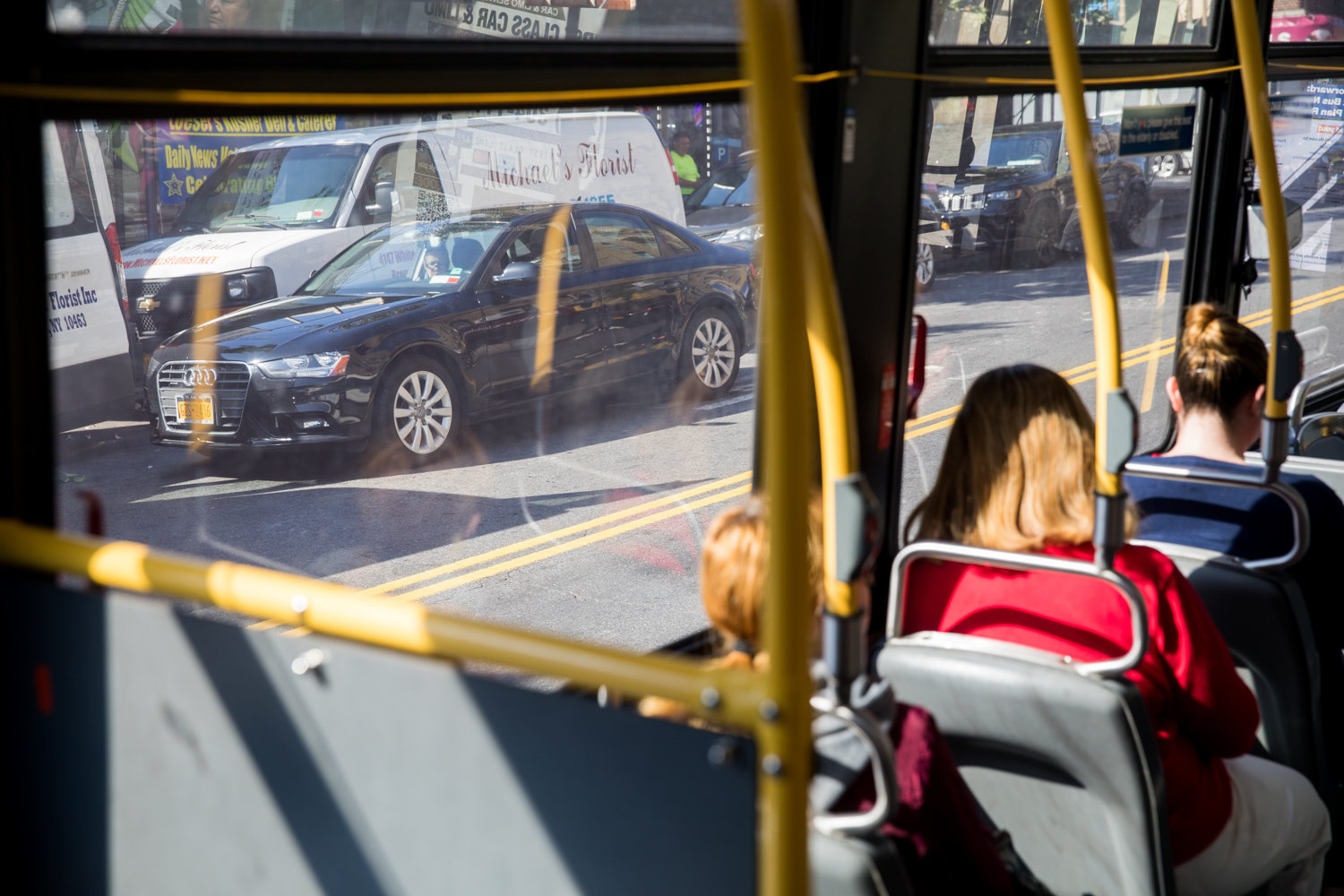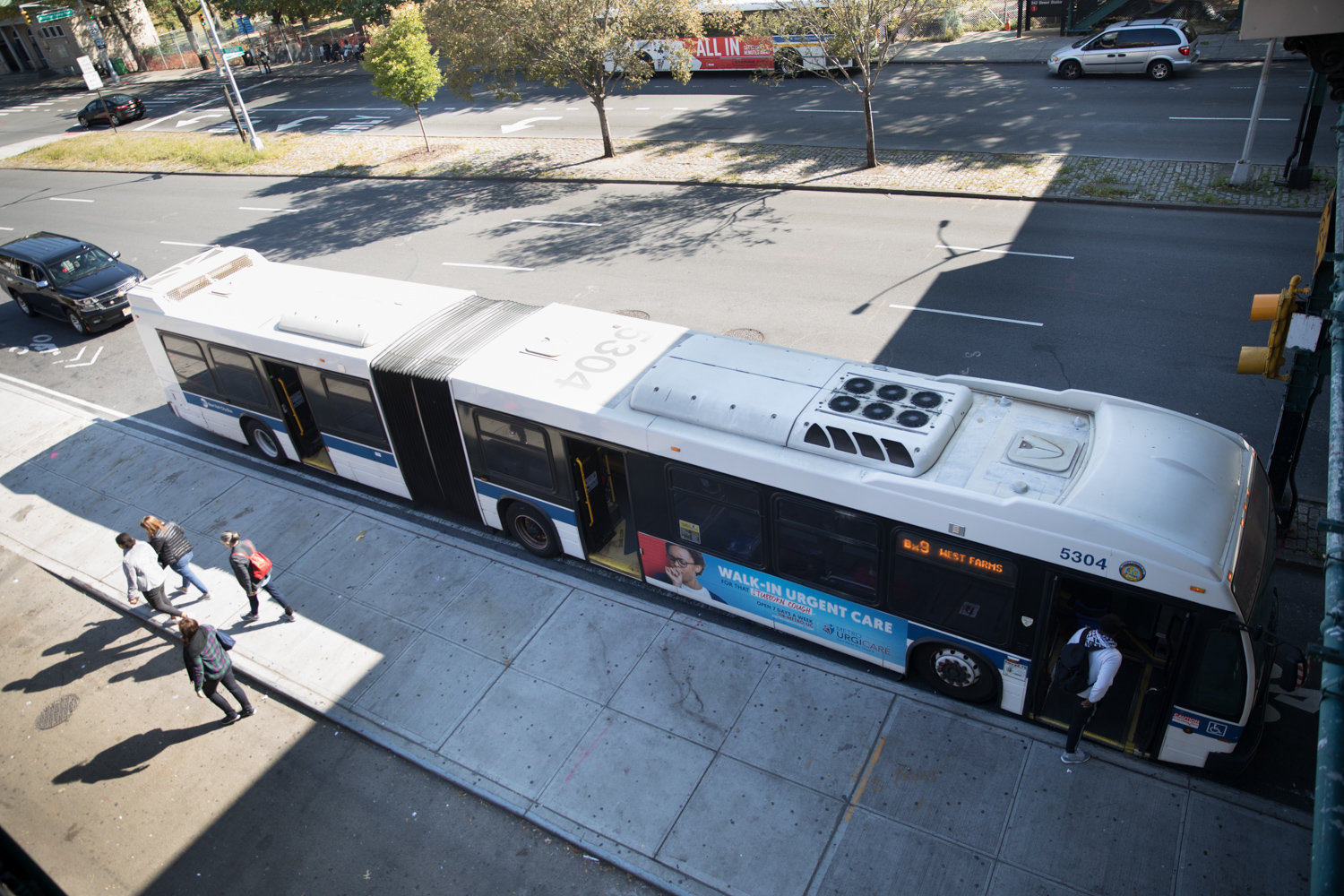Battle lines are drawn in ‘car culture’ wars
Anyone tuned into city council news has likely heard Speaker Corey Johnson talk about “car culture” this past summer.
The term is new, at least to the general public, referring to the preferential treatment cars receive over other types of transportation. In a city riddled with buses, subways, ferries and cabs, owning a car can feel to some like a hassle. But for many, especially in the outer boroughs, it can be a necessity to get from one place to another.
That necessity can make car owners resistant to change. Improving all transit pretty much means cars need to make sacrifices, advocates say. Bike lanes often narrow traffic lanes, and dedicated bus lanes take over a general traffic lane for a good part of the day. Those can feel like major changes, especially to those not getting around on bikes or in buses.
According to the U.S. Census, 58 percent of Bronx County households exist without cars, a statistic not too far off of New York City as a whole. But within Community Board 8, only 39 percent of households don’t have a car available, meaning more than 60 percent do.
That statistic is evident on the streets inside CB8. Cars are parked bumper-to-bumper along many curbs, and even double-parked along busy corridors like Riverdale Avenue and Broadway.
A proposed bus lane on Broadway from West 225th to West 230th streets was widely condemned at a recent CB8 meeting, not just by local business owners, but also by board members. The lane would remove some street parking — something that could have a negative effect on surrounding businesses, owners there say, since their customers rely on those spots to access shops on Broadway.
‘Knee-jerk reactions’
Yet Eben Weiss doesn’t believe the community board meetings really represent the larger picture of the needs of people in Riverdale, Marble Hill and Kingsbridge. A blogger with a popular social media moniker as the “bike snob,” Weiss has pushed for transportation officials to think more about pedestrians, cyclists and mass transit users, and less about the cars clogging up the roads.
“CB8 has a knee-jerk reaction to saying no to anything that involves a bus or a bike,” Weiss said. “Nobody’s talking to the bus riders. It’s the same thing with the Broadway bike lanes. There’s a galvanized group of people who go to shout it down.”
Broadway has been forefront of many changes some might see as unfavorable to cars. That includes the installation of bike lanes and bus pickup islands in North Riverdale — installed despite some local outcry — and now the proposal to construct a southbound lane in through Marble Hill dedicated to bus traffic.
But cars are seemingly standing in the way of all of those proposals. Drivers need open lanes and spaces to park their cars, and removing those is hugely contentious, those opposed to the city transportation department’s latest plans say.
However, making even small improvements can improve life for those not in cars, Weiss said.
“I haven’t done a formal study, but you know what kinds of people I notice?” Weiss asked. “People who look like they’re probably bike delivery people. And I see kids.”
Changes already
The Broadway bike lane is the Bronx’s first protected bike lane. The lane is two-way along the Van Cortlandt Park side of the busy street, and is protected from moving traffic by a row of parked cars.
Councilman Andrew Cohen backed the lane as a safe place for bikers on Broadway, and for providing safe havens across the wide street for those trying to cross to and from the park. Also, more narrow lanes could mean slower traffic in and out of Yonkers.
“I believe that the government has played a role in building a car ownership culture in our society,” said Councilman Ydanis Rodriguez, who represents the part of Broadway where the dedicated bus lane is proposed.
“When we look at communities in other boroughs, we think about the differences between train stations, bus services, the lack of ferries, Citi Bikes and the lack of Citi Bikes in this area … that having a car is the only way they can move around.”
The Bronx does suffer from some of the worst public transit options in the city, according to many bus and subway advocates. Bronx buses are among the slowest in the country, averaging between 5 and 7 mph, according to the Metropolitan Transportation Authority. Moving east and west on the subway is an infamous issue, but even getting anywhere on the 1 train is a challenge, especially with its frequent weekend closures.
Targeted populations, and not for good
Some of the worst transit deserts in the Bronx exist in working-class and immigrant neighborhoods, Rodriguez said.
“The station at 149th Street and Third Avenue. The reason they have abandoned that station is that most people who live in that area are working class and immigrants,” the councilman said. “The stations where the people living around them are immigrants and working class don’t get the same investments as the people in Columbus Circle or the Upper West Side.”
Citi Bike — acquired by ride-hailing company Lyft last year — says it would start offering its rented bicycles in the Bronx by 2023. Yet it was unclear whether riders in Riverdale, Kingsbridge, Spuyten Duyvil or Marble Hill would have easy access to the company’s proposed docking stations around the borough.
Of course, breaking car culture has an environmental component as well. Single-occupancy cars sitting in dead-stop traffic on city streets pour pounds of carbon into the air, advocates say.
But if you’re without fast and reliable bus or train service, a car ride — while the least ecological choice — might be the only option for getting to work, school or appointments on time.
“People shouldn’t have to make that choice,” Weiss said. “People who can’t afford a car shouldn’t have to spend quadruple the time getting somewhere.
“You don’t want to tell the average person, ‘You should make the morally right choice’” of taking public transportation over a private car. “You should make it so they can default to the sensible solution for everybody.”
Car culture has perhaps been officially broken on 14th Street in Manhattan. After a long struggle, the city prohibited all cars from 14th Street between Third and Ninth avenues near Union Square Park, turning the stretch into a bus-only road.
While the move has angered drivers, it’s already shaved nine minutes from a typical M14 bus trip, according to The New York Times.
As for improving the community served by CB8, Weiss is hopeful a shift in priorities is on the horizon, even for those who depend on their car.
“The biggest complaint is how hard it is to park,” he said. “That will never get better.
“We really need to make it possible for people to move quickly and efficiently. So even people with cars can make the decision not to use them. It’s very attainable.”









